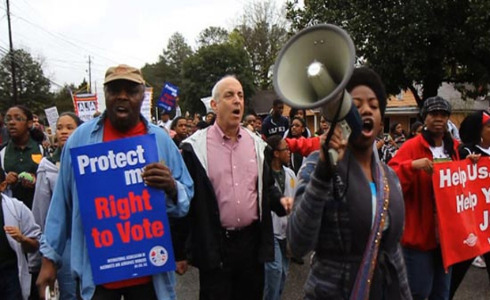
Across the South, Republicans are working to take advantage of a new political landscape after a divided U.S. Supreme Court freed all or part of 15 states, many of them in the old Confederacy, from having to ask Washington’s permission before changing election procedures in jurisdictions with histories of discrimination.
After the high court announced its momentous ruling Tuesday, officials in Texas and Mississippi pledged to immediately implement laws requiring voters to show photo identification before getting a ballot. North Carolina Republicans promised they would quickly try to adopt a similar law. Florida now appears free to set its early voting hours however Gov. Rick Scott and the GOP Legislature please. And Georgia’s most populous county likely will use county commission districts that Republican state legislators drew over the objections of local Democrats.
Chief Justice John Roberts wrote the 5-4 opinion that struck down as outdated a key provision of the landmark 1965 law credited with ensuring ballot access to millions of Black Americans, American Indians and other minorities.
Southern Republicans largely hailed Roberts’ opinion as recognition of racial progress since President Lyndon Johnson signed the law at the apex of the civil rights movement.
”Over the last half-century, Georgia has reformed, and our state is a proud symbol of progress,” Gov. Nathan Deal said. ”Today’s decision guarantees that Georgia will be treated like every other state — a right we have earned.”
Democrats and civil rights attorneys lambasted the ruling as a setback for the very advancement Republicans highlighted, and the dissenters predicted a proliferation of laws designed to curtail minority participation in elections.
For five decades, the law required that certain states and localities with a history of discrimination submit all of their election laws — from new congressional district maps to the precinct locations and voting hours — to Justice Department lawyers for approval. Congress reauthorized the law multiple times, the latest in 2006 with overwhelming bipartisanship capped by a 98-0 Senate vote.
Justice Department attorneys have used Section 5 in multiple cases to block voter identification laws, saying they discriminate against minority and poor voters who are less likely to have the required government-issued documents.
